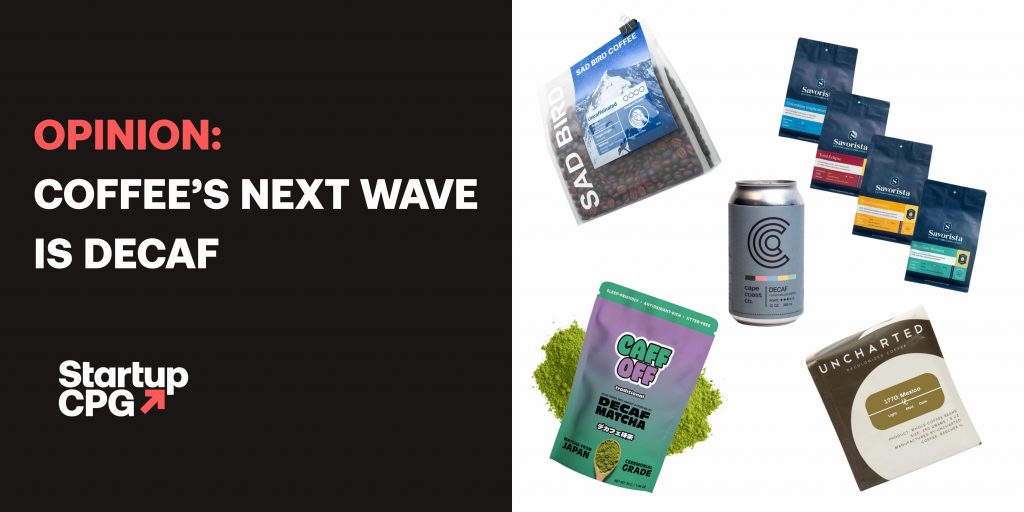Opinion: Coffee’s Next Wave is Decaf
Days after I was green lit to write an opinion piece on decaf coffee, I found myself at a tradeshow with my boss, meeting up for – wait for it – coffee. He ordered an iced coffee, I ordered a decaf iced coffee. The waiter took our orders, only to return minutes later with: “So we can’t do iced decaf coffee, but we can do a hot decaf over ice.”
This all-too-familiar occurrence in the life of a decaf coffee drinker played out perfectly in front of the person I’d made my pitch to. It was a real-time demonstration of exactly what I’d been trying to explain. We’re behind.
According to the National Coffee Association about 10% (26 million people) drink decaf coffee – I expect that number will only get higher.
Decaffeinated Wake-Up Call
For most people who don’t drink decaf, these limited options never register as a problem. But as someone who’s been caffeine-free since 2020 – turns out dumping caffeine onto anxiety while in lockdown wasn’t a great idea – I notice the constraints everywhere I go. After deciding to stop drinking alcohol last August, I began recognizing striking parallels between these two industries and the personal choices they represent.
In my caffeinated days, I could walk into any coffee shop and order an iced dirty hippie (iced chai with espresso shots), a classic cold brew, or an iced matcha latte. The options felt endless. The same freedom existed with alcohol – unless I was at a wine bar, I could order my go-to Hendricks and tonic, Negroni, or Aperol Spritz anywhere.
Fortunately, I quit drinking well into the non-alcoholic movement, when bars had dedicated zero-proof sections and package stores carried real alternatives. But decaf? We’ve got work to do.
The Next Wave of Caffeine: Decaf
Here’s my prediction: more people who quit alcohol while still drinking caffeine will eventually decide to lower their caffeine intake or cut it out altogether. Once you remove the depressant, you might find you don’t need the stimulant either – no extra kick required to face the morning.
Decaf coffee manufacturers are betting on this shift. In early August, I reached out to several decaf brands through our Slack channel, wanting to taste their products and understand their perspective on this emerging wave. Their stories reveal a pattern. Kait Brown of Savorista hit her breaking point in 2016 while working 18-hour days amid family stress, realizing “caffeine was really amplifying my stress, preventing me from sleeping.” Odin Coe, founder of Sad Bird Coffee, had Stanford doctors tell him to cut back on caffeine after multiple concussions. Shannon Sanders Jr. of Cape Coast Co. added decaf because their community kept requesting canned coffee they could enjoy later in the day.
Uncharted Coffee made decaf central from launch because they believed “wellness meant offering a chemical-free decaf option that didn’t compromise on flavor,” according to founder Jasmine Neveles. Caff Off’s founder, Lily Gean, a registered nurse, witnessed firsthand “how much caffeine can affect people’s sleep, anxiety and overall health.” That last one particularly resonates with me.
The Numbers Don’t Lie
These aren’t just feel-good anecdotes – the sales data backs up the demand. Cape Coast Co. reports that 25% of their canned coffee sales are decaf, and they only launched it in May. Their customers are putting their money where their mouths are.
Uncharted Coffee sees about 10% decaf sales currently, with strong traction in ready-to-drink. Sad Bird Coffee and Savorista built entire business models around decaf-only offerings – and Savorista took home the crown in the coffee category for this year’s Shelfie Awards. Caff Off launched this year with decaf matcha as their core product, something I’d never heard of until our team discovered it at a Grocery Run event in Los Angeles.
The demographics challenge expectations too. Uncharted’s customers include expecting mothers, tech entrepreneurs, and professionals who want evening beverages without insomnia. Cape Coast serves students, artists, athletes, and people seeking healthier options. Sad Bird attracts former athletes concerned about brain health and coffee drinkers over 50. Caff Off serves caffeine-sensitive professionals and wellness-focused women. Savorista sees everyone from pregnant women to people with health conditions to folks who are simply “conscious about what they put in their body.”
This no longer feels like a niche – it feels like a necessity.
How Are Brands Decaffeinating?
As more brands join the decaf movement, we’re seeing greater diversity in processing methods and flavor profiles. This variety matters because taste preferences aren’t one-size-fits-all, and flavor always wins.
Cape Coast uses a sugarcane ethyl acetate process that “preserves the bean’s sweetness and balance.” Uncharted employs “natural, chemical-free processes” that maintain their regenerative sourcing standards. Sad Bird exclusively uses Swiss Water and Mountain Water processes that “preserve more of the bean’s integrity.” Savorista relies on Swiss Water processing and Colombian sugar cane ethyl acetate methods. Caff Off uses “a natural water-absorption process in Japan” to maintain ceremonial matcha integrity.
The results speak for themselves: blind taste tests where people can’t tell the difference between decaf and traditional versions. Every brand reports that customers and taste testers cannot distinguish their products from regular coffee or matcha.
Supporting More than a Personal Choice
The industry sees the parallels clearly. Caff Off positions decaf “on the same curve NA beverages were five years ago. First it was ‘why would anyone drink that?’ and now NA is a category unto itself.” Savorista’s founder predicts decaf is “just at an earlier stage of a very similar journey and trajectory that we’re seeing now with non-alcoholic beverages.” Cape Coast notes “the demand is real, and we’re excited to keep making canned decaf more accessible and respected.”
These brands are positioning for mainstream adoption. Uncharted is fielding interest from wellness-focused cafés, boutique hotels, and high-end restaurants. Caff Off reports that “cafes are increasingly looking for better decaf options beyond just coffee.”
What’s Next
I envision walking into a coffee shop as a decaf drinker and feeling as accommodated as someone ordering from a modern bar’s NA cocktail menu. Instead of settling for hot coffee over ice, I’d have access to the same range of preparations, seasonal specials, and creative presentations that caffeinated coffee drinkers enjoy.
This isn’t wishful thinking – the infrastructure is already being built by brands like Caff Off, Cape Coast Co., Sad Bird, Savorista, and Uncharted. They’re proving the market exists and the quality can match traditional offerings.
Whether the coffee industry catches up to this demand or not, one thing is certain: people are already making this choice. They’re seeking out these brands, paying premium prices, and spreading the word. The market is moving whether traditional coffee shops notice or not.
So whether you’re a coffee shop owner or retailer looking to expand your options, a fellow decaf drinker who feels seen, or someone who’s never considered that caffeine might not be serving you – pay attention. Remember when the only non-dairy option (if any) at a coffee shop was soy? Now we have soy, almond, oat, coconut – and more? Be the spot that is ahead of the curve. If your customers ask – listen. Have options ready. This wave is coming, and I think it’s bigger than we might think. Catch it.
Meet the Featured Brands
Caff Off
is crafting decaffeinated ceremonial matcha tea made in Japan that’s naturally decaffeinated using a patented natural water-absorption process in Japan (not solvents or CO₂). It’s gentle, chemical-free, and maintains the integrity of ceremonial matcha – color, taste, and antioxidants.
Their decaf matcha tests at about a 91% caffeine reduction – roughly 4–8 mg per 2g serving versus regular matcha which contains between 38-88 mg of caffeine per serving.

Cape Coast Co.
Makes bold, smooth coffee in a can—so you don’t have to choose between good flavor, clean ingredients, and getting out the door.
Cape Coast Co.’s decaf cans contain around 5-10mg of caffeine.

Sad Bird Coffee
Sad Bird Coffee crafts specialty decaf and low caffeine coffees for those who value clarity and refuse to compromise on quality. Born of their own need for healthier options, Sad Bird creates a simple coffee solution for those who value every detail of their ritual and lifestyle. Enjoy great coffee. Refuse to settle for anything less.
Sad Bird Coffee’s caffeine content ranges from negligible to 50-60mg/cup depending on whether you consume decaf, quarter caff, or half caff.

Savorista
Savorista wants to help you find your proverbial Guiding Star so that, rather than fueling busyness and overcommitment, coffee can take its rightful place in your life as something to be savored.
Savorista is proud to craft astonishingly delicious decaf and half caf coffee that helps you lighten your load so that you can chart your own path and live a life worth savoring.
Savorista’s caffeine content ranges from negligible to half the amount of caffeine in a traditional cup of coffee.

Uncharted Coffee
Uncharted’s 1770 Mexico decaf is Certified Organic and Fair-Trade, supporting ethical and sustainable farming, uses water processed decaf method preserves flavor without chemicals, and is single-origin from Chiapas, grown by experienced smallholder farmers. This is a clean, smooth cup ideal for caffeine-conscious lifestyles, including pregnancy.
Caffeine content for Uncharted’s 1770 Mexico decaf is typically 97% caffeine free.

About Startup CPG
Startup CPG is the biggest community in the world for emerging brands. We have a reach of 135K+, over 25k members in our Startup CPG Slack, and create millions of impressions per month. We host the #1 world podcast in CPG, 100+ events per year, the industry’s largest free award program, and will do anything to help brands grow and shine. It’s free — join today!






All Comments